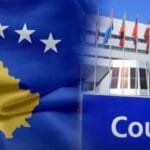“The issue of Kosovo is not on the agenda of the Council of Ministers next week and in this period we cannot say when it might be”, said the spokesperson of this organization Daniel Holtgen, but without giving more details.
The council meets next week and was expected to vote on Kosovo’s request, which last month received the green light from the Parliamentary Assembly of the Council of Europe, prompting confidence in Pristina to meet this goal and anger in Belgrade.
The issue of the establishment of the Association of municipalities with a Serbian majority in Kosovo seems to have become the “Achilles’ heel” in Kosovo’s efforts, as it is the hottest point of the talks for the normalization of its relations with Serbia.
Some of the Western countries, including France and Germany, made it a condition for their vote that Kosovo take concrete steps to establish the Association, based on a draft statute drawn up by Western diplomats that was submitted to the parties in October of last year. However, the Prime Minister of Kosovo, Albin Kurti, called such a condition “absurd” and unacceptable.
“The draft charter of (Miroslav) Lajcak and other Quint emissaries as a document failed to be formalized as it was rejected. As such it is a non-document, so it is a non-paper. The Government of Kosovo cannot send documents which it has not accepted and which are not official to the Constitutional Court, this request to us was and remains absurd”, said Prime Minister Kurti on Wednesday.
Two days ago, after a meeting with the diplomats of the main Western countries in Pristina, he called for membership in the Council of Europe not to be confused with the normalization of relations with Serbia, since these processes are separate.
But the American envoy for the Western Balkans, Gabriel Escobar, who is at the end of his term, said that these processes “are very connected”.
The Council of Europe, he said, “is about the treatment of minorities and Kosovo has made clear commitments to the treatment of minorities and this includes the Association”.
Kosovo and Serbia agreed in 2013 on the establishment of the Association, while in 2015 they agreed on its principles.
But, that same year, the Constitutional Court of Kosovo found that a large part of these principles are in conflict with the Constitution of Kosovo.
In October of last year, European and American diplomats submitted to the parties a draft of the Association’s statute, which must be subject to review of its constitutionality by the Constitutional Court before establishment.
Its establishment is part of the agreement on the normalization of relations which the parties agreed on last year in Brussels and Ohrid.
Serbia launched a campaign against Kosovo’s membership in the Council of Europe, although with the Ohrid agreement it is committed not to oppose Kosovo’s membership in international organizations, VOA reports.







